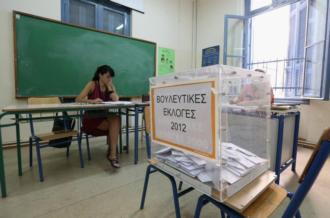Pro-bailout parties secure Greek majority
New Democracy’s Antonis Samaras says result is vote to “remain on European path”, with party set to lead new government.

Greek political parties supporting a bailout for the country have won enough seats in the country’s latest parliamentary elections to form a joint government.
Near complete results early on Monday showed the conservative New Democracy party gaining about 30 per cent of the vote and 129 seats in the 300-seat parliament, including a bonus 50 seats for finishing first, while the pro-bailout Socialist PASOK party came in third with about 12 per cent and 33 seats.
The leftist Syriza party, which had become the standard bearer for the anti-bailout cause, gained almost 27 per cent and 71 seats, while the far-right Golden Dawn party had 6.9 per cent of the vote, earning 18 seats.
Sunday’s vote, which followed an inconclusive ballot on May 6, was seen as crucial for Europe and the world, since it could determine whether Greece was forced to leave the joint euro currency, a move that analysts say would have potentially catastrophic consequences for other ailing European nations and the global economy.
 |
| Click here to follow our Greece elections live blog |
“The Greek people today voted for Greece to remain on its European path and in the eurozone,” said Antonis Samaras, the New Democracy leader, adding that voters chose “policies that will bring jobs, growth, justice and security”.
Al Jazeera’s Barnaby Phillips, reporting from Athens, said the demographic division over economic policy between different age groups was quite dramatic, with younger voters far more likely to vote for Syriza, while older Greeks were more conservative.
Youth vote
“The youth went for Syriza, and when you look at Greece’s youth unemployment, that’s understandable,” he said.
Alexis Tsipras, Syriza’s leader, conceded defeat late in the day, saying his party would not join a New Democracy-led government and would continue to oppose the bailout.
“We represent a majority of people opposed to the bailout deal,” said Tsipras. “”We will be present in these developments from the position of the main opposition.”
Greece has been dependent on rescue loans totalling $300bn since May 2010 after sky-high borrowing rates left it locked out of the international markets and unable to meet debt payments.
The spending cuts made in return have left the country mired in a fifth year of recession, with unemployment rising to above 22 per cent and tens of thousands of businesses shutting down.
Virtually unknown outside of Greece four months ago, Tsipras and his party shot to prominence in the May 6 vote, where he came a surprise second and quadrupled his support since the 2009 election on the back of public frustration with traditionally dominant New Democracy and PASOK and their failure to address the country’s financial travails.
Tsipras had vowed to tear up Greece’s bailout agreements and repeal the austerity measures, which have included deep spending cuts on everything from health care to education and infrastructure, as well as tax hikes and reductions of salaries and pensions.
Samaras, for his part, cast the choice as one between the euro and returning to the drachma. He pledged to renegotiate some of the bailout’s harsher terms but insists the top priority is for the country to remain in Europe’s joint currency.
‘New era’ for Greece
 |
| Opinion polls pitted the anti-bailout party Syriza against pro-bailout New Democracy [GALLO/GETTY] |
“Today the Greek people speak. Tomorrow a new era for Greece begins,” Samaras said after voting in southern Greece.
Earlier on Sunday, about 10 men armed with sledgehammers and wooden bats attacked a polling station in central Athens, wounding two policemen guarding it and setting fire to the ballot box shortly before polls closed.
The attack – the only one reported so far – took place in the Athens neighbourhood of Exarhia, a traditional haven for leftists and anarchists.
Greek police were also investigating the discovery on Sunday of two unexploded hand grenades outside private Skai television station on the outskirts of Athens.
Demetris Tsiodras, the Greek government spokesperson, denounced the devices as an attempt to spoil the smooth running of the election.
Wolfgang Schaeuble, Germany’s finance minister, called New Democracy’s victory a decision to “forge ahead” with implementing far-reaching reforms.
Schaeuble said it was important for Greece to stick to its agreements with creditors, but held out the prospect that Athens might be given more time to comply with them.
Germany, Europe’s biggest economy, has been a major contributor to Greece’s two rescue packages and a key advocate of demanding tough austerity conditions.